Peter MALONE
Saturday, 18 September 2021 19:26
Captain From Castile
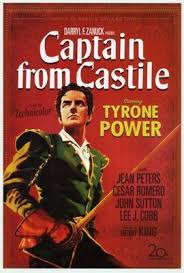
CAPTAIN FROM CASTILE
US, 1947, 140 minutes, Colour.
Tyrone Power, Jean Peters, Lee J. Cobb, Caesar Romero, John Sutton, Antonio Moreno.
Directed by Henry King.
Captain from Castile is a long big budget colour adventure of 1947 from 20th Century Fox at a time when it was making such films as Forever Amber. However, Fox was more famous for its black and white realistic documentaries, comedies and Westerns. Tyrone Power had been a popular hero of many films from the 30s. At this time he made similar colourful adventures as The Prince of Players and The Black Rose. Caesar Romero is a jovial and brash Cortes.
The film is interesting in its presentation of 16th century Spain as well as the New World and the confrontations of the ambitious and greedy Spaniards with Montezuma and the Mexicans. There is also some interesting background and harsh comment on the role of the Inquisition and its influence on Spanish life. The director is Henry King, a veteran of many films from the 30s with quite a range of topics from Lloyds of London, also with Tyrone Power through The Song of Bernadette to adventures like David and Bathsheba and Untamed (also with Power) and the version of Hemingway's The Sun Also Rises. This is interesting and enjoyable rousing adventure.
1. An enjoyable historical romance? The appeal of historical films, adventure?
2. The big budget of the film and its impact, length, use of colour, locations. the atmosphere of Mexico, the rousing score? The stars of the 40s? A re-creation of 16th century old world and new? The appeal to the general audience?
3. The film as pageant: the presentation of society life and ordinary life in Spain's 16th century, the contrast with Mexico and the New World, Montezuma and the Aztecs? The pageant of Cortes and his exploration battles? Colourful presentation of historical tableaux?
4. The film as adventure: the initial fights, duels, imprisonments and torture, killings. the expedition. battles?
5. The film's presentation of 16th century Spain and its judgment on it: the hunting of the slave the tormenting of the girl with her laundry? Da Silva and his arrogance, his place with the Inquisition and his discussions, his arrogance about the Church and the role of the Church and heresy? Arrests, torture and killing in the name of religion? Themes of elegant courtshipf themes of vengeance? The motivation of Spain going to the New World, exploration, gold and greed? The arrogance of the Spaniards taking over the New World? Their presuppositions about the Mexicans? The place of the Church? Audience response to this world, similarities with contemporary world,, differences?
6. The presentation of the New World: so little time after the discoveries of Columbus, Cuba and its importance, Mexico and the Spanish hopes? The isolation of the Spaniards in the New World, the ships and their destruction, the men who went to this world as warriors, adventurers? The camp followers and the place of the women? The hardships of life, the clashes? The hopes of empire? The rights of the Spaniards over the rights of the Mexican Indians? How well was this vocalised by the runaway slave appearing as a prince in his own right? Pedro and his inability to answer the challenges of the Indian? Pedro as hero? Tyrone Power's presence and style? Audience identification with him as hero? His participation in the hunt, his saying of the slave. his intelligence, his place in his family. the clash with Da Silva? His encounter with the girl and his saving her from the ruffians, taking her to the inn? His hospitality and friendship at the inn? The encounter with Juan and the friendship? His fiancee and his courtship of her? His dining at home. the bonds with his family and the challenge of Da Silva? The stance on the Inquisition and freedom? His response to his parents' arrest and torture, his own arrest, his sister's death? His imprisonment, the escape with the help of Juan and the girl? The importance of his thinking he killed Da Silva? The friar and his confession, his penance? The exhilaration of the New World and the hopes for it, his going there? Participation in the adventures, the encounter with the girl., the potion, the dancing and his declaration of love and his marrying her? His happiness with her and the prospect of their child? His friendship with Cortes, promotion, his guarding of the jewels and his failure, the mission to rescue these, the encounter with the rebels. his use of his wits? His heroism in the battles? The arrival of Da Silva and his oath, the challenge at the meal, the imputation of his guilt and his being prepared to face death? His being wounded by his wife, his survival and participation in the Spanish Empire? A satisfying portrait of a Spanish hero of the 16th century. strengths and weaknesses?
8. The portrait of the Vargas family - the nobility of the father, the wisdom of the mother, the young girls their declaration of their beliefs, the arrest and torture, escape?
9. Da Silva as villain yet his cruel self-righteousnessf his treatment of Juan's mother. his arrogance with the Vargas family, the cover-up with the girl's death? His taunting Pedro in prison and his almost dying? The irony of his arrival in the New World.. his cowardice and protection behind Cortes hospitality. his insulting the family? The irony of his death at the hand of the Indian?
10. The heroine as an ordinary girl working at a tavern, the ruffians, her being rescued by Don Pedro and her devotion to him, help in his escape? Her love for him in the New World, the use of the spell, marriage, the child? Her stabbing him to save him from execution? The encounter with the friar and his discussion about repentance and God's compassion? An appropriate heroine?
11. The portrait of Cortes and his being known from history? His extrovert personality and ambitions, rule? Attitude towards Mexico? Greed, the jewels, attitudes towards his men? His quick judgement on Pedro and commissioning him to find the jewels? His attitude towards the mutineers? The encounter with the Mexicans and his patronizing of them, the use of guns? War and conquering? The burning of the boats? His attitude towards Da Silva and the execution of Pedro? The achievement of Cortes, as viewed by the film, comments now?
12. The supporting characters and their contribution? Juan and the initial encounter with Pedro, imprisonment.. the killing of his mother.. his going to the New World and his ambitions friendship with Pedro and his wife. the scene of his drunkenness and his almost being killed,, his hatred of Da Silva? An example of the types who went to the New World? The charlatan with his spells and the reading of the stars - humour. realism? The friar and his attitude towards religion, his tearing up of the charge against Pedro, getting him to do penance, accompanying the expedition. his sermon against greed? A favourable impression of the chaplains to the expeditions? The various soldiers, the mutineers etc.?
13. The film's presentation of the Inquisition, its power and cruelty, self-righteousness? As embodied in the dialogue of Da Silva? The noble to whom Pedro turned but refused to help him? The introduction of the Inquisition into the New World and the anticipation of torture and the rooting out of heresy etc.?
14. How well presented were the Mexicans, their dignity and civilization, the confrontation with the Spaniards, their asking them to go home, their destruction?
15. The pageantry of the battle sequences and the bringing home of the conquest of Mexico and its rights and wrongs?
16. How enjoyable an adventure? What do audiences learn from such historical romances about the past? The implications for history, human nature, good and evil, right and wrong?
Published in Movie Reviews
Published in
Movie Reviews
Tagged under
Saturday, 18 September 2021 19:26
Captain Blood
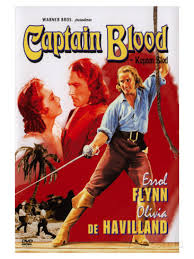
CAPTAIN BLOOD
US, 1935, 119 Minutes, Black and white.
Errol Flynn, Olivia De Havilland, Lionel Atwill, Basil Rathbone.
Directed by Michael Curtiz.
Captain Blood was an important action adventure of its day. It came comparatively early in the era of sound films and was one of Warner Bros. most spectacular productions of its time. It set a style for action thrillers that this company made over the next ten years. The film also made a star out of Errol Flynn. He had appeared originally in his native Australia as Fletcher Christian in the Chauvel film In the Wake of the Bounty. His performance is by no means memorable in this film. He does make quite an impression as Captain Blood. For the next ten years he was to be one of Warner Brothers' biggest stars appearing in all kinds of adventures, including The Adventures of Robin Hood, The Charge of the Light Brigade. He made many westerns and in the early 40s a great number of war
movies. Frequently he was directed by Michael Curtiz and Raoul Walsh. Olivia de Havilland was his leading lady in this film and in seven consequent films.
The action is rousing, the pace is good, studio work and camera work excellent. The film is also enhanced, as were so many of the succeeding adventures, by the rousing score of Eric Korngold. one might say that Captain Blood is the archetypal Hollywood swashbuckling adventure.
1. Was this an entertaining film? Why? What were the main entertainment ingredients? How did it use conventions of adventure and pirate films? Heroes?
2. Comment on the production values of the earlier 30s: acting, sets and costumes, Korngold's music? How did they contribute to the atmosphere and the pace of the adventure?
3. Was this a good film about history? Or was history merely the occasion for the adventure? How lighthearted was the adventure? Did this add to the film and the quality of the adventure?
4. Comment on Errol Flynn as a swashbuckling hero. Why was he so popular?
5. What presuppositions about heroisms and heroes did the film have? About gallantry? About patriotism and loyalty? About good nature to one's fellowmen? About good behaviour and manners? of the need for violence in the face of tyranny? How did these values stand up by today's standards?
6. What did the film have to say about the theme of justice, Judge Jeffries, the king banishing prisoners to the West Indies, Bishop in the West Indies, the governor and his moods and his gout? Was this a serious comment on justice? Is this what the popular mentality holds about injustice?
7. What comment did the film make about slaves? Its comment on the value of human dignity and person's buying each other? The contrast between Arabella's buying Peter Blood and the reverse situation later? How was this illustrated during the encounters between Arabella and Peter Blood?
8. Was the picture of Port Royal interesting? The cruelty to the slaves? Society?
9. How realistic was the escape? Did this matter? What feeling of exhilaration did the escape give?
10. Why did Peter Blood turn to piracy? Did he have any alternative? Why were his men so loyal to him? Did they do any injustice to anyone as pirates? why did they have the alliance with the Frenchmen? was this quickly broken? The importance of the sword fight between Peter Blood and the French pirate? Especially in the context of the capture of the English lord and Arabella?
11. How well filmed were the battle sequences? Especially the siege of Port Royal? The irony of Peter Blood's being commissioned by King William? Questions of loyalty to England, etc.?
12. What is the value of this kind of film? Is it merely comic-book adventure? Or is it cliche and convention? Or do these films have a vitality despite their impossibilities at times which makes them worthwhile films with some comment on human behaviour to make? What would you say were the main qualities of the 30s adventures after seeing this film?
Published in Movie Reviews
Published in
Movie Reviews
Tagged under
Saturday, 18 September 2021 19:26
Capricorn One
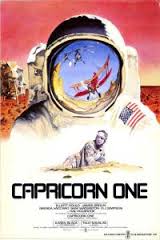
CAPRICORN ONE
US, 1977, 124 minutes, Colour.
Elliott Gould, James Brolin, Brenda Vaccaro, Sam Waterston, O.J. Simpson, Hal Holbrook, Telly Savalas, Karen Black.
Directed by Peter Hyams.
Capricorn One is an elaborate space cover-up with all the overtones of exploration plus detective story cum chase thriller. Spectacular 70 mm. helicopter pursuits and car-out-of-control speeding through Houston are highlights. Writer-director, Peter Hyams, controls the plausible-implausible plot for maximum involvement, but has written it so well that each role, no matter how small, makes impact - an editor, Telly Savalas as an eccentric pilot, David Huddleston as a wily Congressman. But Hal Holbrook as the NASA mastermind is excellent, especially in the beginning, for persuading us that this could happen. Elliot Gould, James Brolin, Brenda Vaccaro head the good cast. Very enjoyable action melodrama.
1. Enjoyment of popular space films, interest in American space projects, the adventure ingredients, the detective work, the background of American politics of the 70s? How well combined for successful adventure?
2. The qualities of the film: the portrayal of the space programme and its technology, the special effects - even when they were contrived by television, the car out of control through Houston, the helicopter chase, use of colour. Panavision, locations? Musical score? Their contribution to atmosphere?
3. The qualities of the screenplay; the use of dates for suspense and the build-up of an authentic atmosphere that this could happen, the importance of the television commentator describing and his place as a giver of the narrative? The importance of the various speeches, especially those by Kelloway? The use of cross-editing for the various strands of the story and their commenting on one another? The contribution of the minor characters and their strengths of dialogue e.g. the senator, the newspaper editor, Karen Black's character? The contribution of such small sequences as Katy's reading the story to her children? A strong screenplay?
4. The initial atmosphere and audience involvement: the darkness during the credits and the gradual revelation of the space craft, the atmosphere of the space exploration and the blast-off, the authenticity of NASA, the details of technology and the people in control? The atmosphere of the observers? The astronauts themselves and their mission, the sequence of the taking of the Bible to Mars? The plausibility of a Mars project? The ominous approach while the astronauts were ready for taking off, the door opening, the countdown and the absence of the astronauts, the cross-cutting of their leaving the spaceship? An atmosphere of mystery?
5. The political background with the arrogant Senator, his comments on the Vice-President?, the presence of the Vice-President? and his ineptness? The senator pulling his weight as regards the souvenir binoculars? The indications of political pressure? The irony of comments that the President was not present? Attitudes towards the space programme by officialdom? The senator's presence later in the film, especially during the landing, the phone call from the Vice-President? and his reactions, their presence at the funeral memorial? The comment on American politics?
6. The personalities of the three astronauts? Their response to the mystery? How well individuated were their characters - black and white, comical and serious? Walker as serious, Wallis and his comedy? Brubaker as hero? Their discussion amongst themselvesf listening to Kelloway's explanation, their work in the space programme? Their reaction to the blackmail by Kelloway? Their complying,, remaining so many months with the deception, their going through with the fake landing? Their fears for their family, their reliance on Brubaker? His almost breaking during the interview? Their going along with the splashdown? Their realisation that something was wrong and their estimate of the heat shield breaking? The necessity of their escape? The melodrama of getting the plane, the take-off, no fuel, the landing? Their decisions about moving through the desert in different directions? Their particular journeys and hardships - Walker and his searching for water, seeing the helicopters like vultures? Wallis and his talking as he climbed the cliff and his being caught? Brubaker and his burying himself, hiding in the cave, the snake, eating it, the rain, the scorpion? The continual pursuit of the helicopters? How well delineated these three astronauts and their being victimised by their profession?
7. Kelloway as the crucial character for the credibility of the film? His presence at the blast-off? His control and motives? His speech to the astronauts with its emotion, its analysis of the space programme and his involvement in it? His playing God with their lives, his attitude towards politics and politicians? The implications of his speech as regards history, the cost of the space race? Prestige? How credible for the audience? For the men themselves? The irony of his blackmailing them emotionally? The further irony of his visiting Katy, his sympathetic speech, the arrangement for the funeral service and yet meanwhile in communication as regards their deaths? A man of intellect and planning? Unscrupulous? The irony of the ending and how he would cope? Comment on the way that his speeches were filmed - especially the close-ups to make them seem convincing? His character as a comment on the space race?
8. The background of Elliot and his awareness that something was wrong, his reporting to the authorities, his talking to Caulfield, his worry and disappearance, the irony of his apartment completely being taken over? The comment on conspiracies?
9. The atmosphere of the touchdown and the patriotism, the presence of the wives? The importance of the interview sequences and the emotivity with the wives talking with their husbands, the irony that this was faked? The further build-up towards the heat shield, the press conference given by Kelloway and his hypocritical presentation of the themes - and the three men commenting on what he would be saying?
10. The journalistic background of the film, especially with Caulfield? As a hack reporter? His ordinariness, covering situations, ambitions and theories, relation with Karen Black, his playing pool with Elliot, curiosity being roused, his inquiries and visit to the apartment, the melodrama of his car out of control and going into the river? The tact of his visit to Katy and getting information? The visit to the western town and his being shot at. His being arrested and the drugs being planted, his time in jail? His speech to the editor and the ironic remarks and his being fired? His enlisting Karen Black's help and information as regards military bases? His ingenuity, the discovery of the base, his quick-wittedness with getting the plane, the rescue? The point being made that an ordinary type of man can save?
11. The portrait of the editor and his attitudes towards Caulfield? The repartee especially about journalese movies? Karen Black and the portrait of the tough newspaper reporter, her interviewing Katy, the risque repartee with Caulfield?
12. The portrait of the wives? Their presence at the important events, talking to their husbands? The focus on Katy, e.g. the long tracking shot of her reading the story to her children? Reading the poem to her husband? The children and their father as hero? The visit of Caulfield and her talking with him, the visit of Jim and her working in the garden, the build-up to the funeral? Showing the home movies? How good a portrait of an American wife?
13. Brubaker as hero and the emphases on his capacity for survival? His finding of the gas station and the pursuit of the helicopters, the shoot-out? The rescue? The heroism of hanging on to the plane?
14. Telly Savalas and his interpretation of the crop-dusting pilot? The humour of his explanation of A and A, his talk about his son, money? His dim view of everybody as perverts? His taking Caulfield's money, his skill in the plane, his frequent comments to Caulfield to get out of the way, the rescue of Brubaker, the eluding of the helicopters, the chase and their crash?
15. The impact of the ending and audience expectation? The solemn words of the ceremonial and the effect of Brubaker and Caulfield arriving? The final look at them running towards the people? Achievement?
16. The qualities of the film as adventure and as detection?
17. Themes of survival and heroism and truth?
18. American politics of the 70s, honesty, prestige? The space programme and its value? Playing God and who is to make decisions about peoples lives, the nation, the role of the ordinary people in determining events?
Published in Movie Reviews
Published in
Movie Reviews
Tagged under
Saturday, 18 September 2021 19:26
Capone
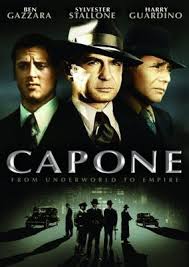
CAPONE
US, 1975, 101 minutes, Colour.
Ben Gazzara, Susan Blakely, Harry Guardino, John Cassavetes, Sylvester Stallone.
Directed by Steve Carver.
Modern filmgoers could be experts on the personalities of the Mafia, Prohibition and Depression gangsters, their lives, greed, self-importance and myths. The most famous of them all was A1 Capone. As they say, this is his story. The content, style and impact of this film is much like the others, but it has been made more carefully than some of the more exploitive examples. Ben Gazzara captures the devious arrogance of Capone that took him to power and wealth, but also to imprisonment and mental decay. He is no way likeable but his drives and ambitions are fascinating. Less violent than others of its kind.
1. The impact of this gangster film? Interesting. entertaining? The purpose of its being made in the seventies? For what audience?
2. Comment on the gangster genre, its conventions, audience expectations moralizing? Was this a better than average example?
3. The time structure of the film, the device of the red fade-ins and fade-outs, the documentary tone? The sense of realism about Capone's life and career?
4. The film as a piece of Americana? The New York settings of the early part of the century, the build-up of the Mafia, its methods. personalities and styles? The nature of small protection? The influence of Prohibition? Chicago, violence and power? The picture of the American heritage?
5. The importance of the introduction to Capone, his device of gaining attention and power? As an indication of his methods and his later career?
6. How well did the film focus on Capone as a man? Within his context? His devious nature. his crude methods. repellent personality? The details of his struggle and his rise? His making mistakes and his capacity to overlook them? The skills in power and violence? The nature and extent of his ambitions? His lack of conscience? His personal feelings, friendship for Torrio, for Iris, for Nitti?
7. The picture of Chicago and its enterprises? The rise of Protection. Bootlegging? Hits. for example, Colosimo? Johnny Torrio and his dividing of the city? Capone's disappointment with this?
8. The city's divisions. the gang wars and the visualizing of these, for example. Capone at golf and the slaughter of O'Bannion? The racial differences of the groups? The conceding of power. the grabbing of power?
9. The picture of political corruption? The deals done with the criminals? The pressure put on the politicians? Immorality and amorality?
10. Iris and her fascination with Capone? Her influence on his life?
11. Capone and his rise to fame? The double-crossing of Torrio? The attempted assassination? His pride? The St. Valentine's Day Massacre?
12. Nitti as an echo of Capone? But more shrewd? Learning the message of the master?
13. The impact of Iris's death? The visual impact of this? The effect on Capone?
14. The drama of the case against him, his prison life. the passing of time, his passing from fame?
15. How much pathos in the deterioration, the ageing and the madness? The themes and the dramatic impact of his final soliloquy? The summing-up of his life?
16. The film's attention to detail. re-creation of the period, the massacres, the St. Valentine's Day Massacre?
17. The values of these men? Their place in American history? Their influence, people's reaction against them? A pessimistic look at human nature?
Published in Movie Reviews
Published in
Movie Reviews
Tagged under
Saturday, 18 September 2021 19:26
Can't Stop the Music

CAN'T STOP THE MUSIC
US, 1980, 117 minutes, Colour.
The Village People, Steve Guttenberg, Valerie Perrine, Bruce Jenner, Tammy Grimes, June Havoc, Paul Sand, Barbara Rush.
Directed by Nancy Walker.
Can't Stop The Music is pre-packaging and selling at its most commercially successful. Producer Allan Carr said in 1978 he loved '40s musicals. With comedienne Nancy Walker directing, he has lifted (with verbal acknowledgement) those Judy Garland- Mickey Rooney stories of music, the show and stardom. This time it is a genial Steve Guttenberg (aided by a lively Valerie Perrine and staid ex-Olympic athlete Bruce Jenner plus, for the oldies, Tammy Grimes, June Havoc and Barbara Rush doing comic turns) who writes disco songs , forms a group and ... that's it. The Village People are flamboyant in feathers, leather etc., the songs have disco verve (sometimes with elaborate split-screen techniques) and audiences are flocking.
1. An entertaining musical? The music, disco rhythms, the showbiz story? The pre-packaging of 1980? Disco music, the Village People as a group, the film itself, the L.P.? Audience response to advertising and promotion?
2. A movie of 1980? Later responses? The use of wide screen, colour, split-screen effects for the credits, for the Y.M.C.A. number?
3. The choreography and its vitality? Atmosphere of New York, San Francisco?
4. The popularity of disco music, the songs, choreography? The echoes of the tradition of American musicals?
5. Village People as a group? The individual members and their personalities, style? As a group? The impact of their singing, showmanship? Flamboyance? The individual characters and their dress, symbols of types of the 170s and '80s? The appeal - age group, men, women?
6. The background of the old Judy Garland- Mickey Rooney musicals? The transition to the '70s and '80s? The composer and his music, giving up his job, carefree attitude towards life, the disc-jockey, the help of friends, the formation of a group, auditions, difficulties, advertising? The show and success? The perennial appeal of this material? Jacques as hero? Seeing him at his initial work, his exuberance during the credits and being pictured in New York, his enjoyment of his own songs and composing them? His work as a disc jockey, a composer at home? His friends? The need for a group? His friendship with Samantha? Sharing the flat, her urging him on to success? Her contacts and professional help? Jacques and his mother and her arrival? The preparation for auditions, getting the record? The audition at home, the failure in the studio? His going on to the plane with his mother to pressurise the manager? His joy at the end?
8. The portrayal of Samantha - as a model, her mocking of her photo at the beginning, her sharing with Jacques? Her relationship with him? Her attraction towards the lawyer, sexual liaison, criticism of his narrow-mindedness? Her clashes with Sidney? The pressure of Sidney's visit? The decision to make the milk ad? Her presence during the songs, in the milk ad itself? Her not going on the plane with her former boyfriend? Her clashes with him, persuading him to listen to the group? The happy ending for her? The glamorous all-American girl! The presentation of the legal firm - the law and its relationship to records, groups? Strictness, being uptight? The lawyer and his infatuation with Samantha, his stiffness during the visit, his return? His participation in the auditions in the office? His getting the sack? His jealousy of Samantha? His presence at the end and the happy ending? His mother and her interest in the group, her arranging the concert? The elderly lawyer and his severe attitudes especially after the auditions in the office? His taking on the group at the end? The satire on the legal profession?
10. The humour in the character of Sidney? Tammy Grimes and her voice, dresses - the Wicked Witch of the West! Her pressure on Samantha, her control, her participation in the exuberance? Her role at the end? Lulu and her working for Sidney? Her being sex-mad? The innuendo, training the group? Her work for the group? Sidney and the promotion of the milk commercial? The humour of her sequence in the phone booth and her caught fingernail? Comic touches?
11. Mrs Morelli and her exuberance, her visit, pride in her son? Joining in the singing? Her pressure tactics with her son on the plane?
12. The character of Lulu and the comic touches? The emphasis on sex jokes? Her work? Friendship with Samantha?
13. The party sequence and the auditions at Jacques' how? The auditions in the office? The audition in the recording studio?
14. The contribution of the songs and their choreography and visual techniques: the initial New York song, 'Magic Nights', the song in red, the milk commercial, 'Y.M.C.A.', the title song and its long finale?
15. An enjoyable popular concoction of 1970s-80s? Reflecting the attitudes of the times?
Published in Movie Reviews
Published in
Movie Reviews
Tagged under
Saturday, 18 September 2021 19:26
Can't Help Singing

CAN'T HELP SINGING
US, 1944, 90 minutes, Colour.
Deanna Durban, Ray Collins, Robert Paige, Akim Tamiroff.
Directed by Frank Ryan.
Can't Help Singing is a pleasant but dated musical of the early '40s.
Deanna Durban had made her impact at Universal and appeared in numerous films with great box office success. This is her only colour film. It had a 19th. century setting - Washington and the South as well as the West. There are many colourful scenes with the army in Washington and in western towns as well as pageantry of the wagon trains.
Deanna Durban shows a lively sense of humour. There is eccentric comedy support from Akim Tamiroff and Leonid Kinskey as a pair of Russian exiles who are conmen. Thomas Gomez looks in at the end - as a man with a great reputation who is supposed to be the fiance of the heroine. Ray Collins is her father and Robert Paige is the stolid but pleasant hero.
The film also has the benefit of some Jerome Kern music - especially the title song which is continually played throughout the film.
A pleasant look at the manners of Washington, of the opening up of the goldfields, of the South with the showboat and the various cities that were being opened up in the 19th century. Plus the touch of the West.
(The film might be compared to the tongue-in-cheek colour adventure comedies made at Universal at the time, especially with Yvonne de Carlo: Salome Where She Danced and The Song of Scheherezade.)
The film is a modest musical, Universal-style, rather than that of the lavish colour of the Fox musicals of the time and the beautifully executed M.G.M. musicals.
Published in Movie Reviews
Published in
Movie Reviews
Tagged under
Saturday, 18 September 2021 19:26
Canterville Ghost, The/ 1985
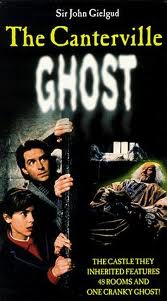
THE CANTERVILLE GHOST
US, 1985, 100 minutes, Colour.
John Gielgud, Ted Wass, Andrea Marcovicci, Alyssa Milano.
Directed by Paul Bogart.
The Canterville Ghost was first filmed in the '40s by Jules Dassin with Charles Laughton, Robert Young and Margaret O'Brien. This made for television movie of the '80s caters for an international audience, especially Americans, with the family coming from the United States.
However, the film is a tour de force for John Gielgud who was 81 when he made this film. He gives it the Shakespearian treatment with his presence and oratory. But he also seems to enjoy being a ghost and the special effects. His presence gives the film quality. It was directed by American director Paul Bogart, director of movies (Mr. Rico) and an amount of television work.
1. The story based on an Oscar Wilde fantasy? The '40s version? The quality of the remake?
2. British production, locations? John Gielgud and his presence, oratory and style?
3. A pleasant blend of reality and fantasy? A modern fable?
4. The arrival of Harry, Lucy and Jennifer? American background, impressions of England, arrival at the station, their hopes, the butler, the cart, the eccentric relatives, staying three months, disbelief at the ghost?
5. The story of Sir Simon? His history, the 17th. century, his history of haunting? His boasting of his capacities as a ghost? His absence from the portrait? The various tricks, raising the butler from the ground, tying up the wife? His trying to scare Lucy and her defiance of him? The encounter with Jennifer? Conversation, becoming friendly? The meal and his exploding the food in the face of the guests? His saving Marry with his fall? A pleasant ghost, 300 years, the ghost-buster and his raising the spectre of his wife? Sir Simon's sadness, sitting in the cemetery, not being able to die? His plan to get Lucy away from the house? Reversing the situation on Jennifer's request? Taking Jennifer to the place where he died? her love for him? His death? Appearing in the portrait? A rhetorical and stylish Sir Simon?
6. Jennifer as a pleasant young girl, moving away from America, her memory of her own mother, relationship with Lucy, with her father? The first encounter A0 the ghost? Visiting him in his room? Sharing his history and experiences? The boy at school and the attraction? His being scared at the cemetery? Helping Simon? Wanting Lucy to go, reversing her opinion, her saving Simon?
7. Harry and Lucy, an American couple, not being scared, thinking it was all special effects, the plan to sell the house, gradually believing in the ghost, the uproar of the meal, hostility? Lucy going, the clash with Harry, his wanting her to come back? Being helped by Sir Simon? Harry and his wariness, his fall from the roof, love for Jennifer, clash with Lucy, wanting her back? The happy ending?
8. The relatives and their fears, not going in the house, being scared of Sir Siption, the exploding meal?
9. The butler and his eccentricity, floating, helping, trying to find the luggage? His wife and her being tied up? With Jennifer in the chapel and the reading of the curse?
10. The boy at school, attracted to Jennifer, scared in the cemetery?
11. The ghost and his setting up the mechanics to raise the spectre? His success, fainting? His hearty appetite afterwards?
12. A pleasant ghost story, the touch of history, the ghost and his purgatory, the love and repentance of his selfishness? His being helped by Jennifer's love?
Published in Movie Reviews
Published in
Movie Reviews
Tagged under
Saturday, 18 September 2021 19:26
Canterville Ghost, The/ 1943
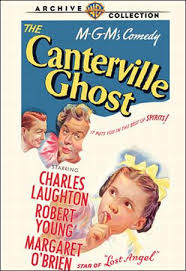
THE CANTERVILLE GHOST
US, 1943, 95 Minutes, Black and white.
Charles Laughton, Margaret O'Brien, Robert Young, William Gargan, Rags Ragland, Peter Lawford.
Directed by Jules Dassin.
The Canterville Ghost was a popular comedy of the war period - and emphasized good relationships between England and America in the war. Director was Jules Dassin, a director from radio at the beginning of his cinema career. He was to make such films as Brute Force and The Naked City before moving to Europe during the black-listing period where he made films like Rififi and He Who Must Die. During the 60s and 70s he made several films with his wife Melina Mercouri Never on Sunday, Topkapi, A Dream of Passion. Charles Laughton does a pleasant parody of his Henry VIII style. Margaret O'Brien shows her ability as a little girl actress - as she did in Meet Me in St. Louis the following year. A pleasant comedy which has not entirely dated and still has some appeal.
1. An entertaining piece of whimsy, fantasy? War propaganda? Its impact in America and Britain during 1943-44? Now?
2. Charles Laughton's style and presence as the comic ghost? Margaret O'Brien and her talent, the appeal of a pleasing young child? Robert Young as popular hero? A popular blending of the stars for sentiment and comedy?
3. Hollywood's presentation of England - creation of British atmosphere, the light touch and parody? The importance of America's war effort and contact with Britain? The references to heroism, Germany and the Nazis? The light touch for war propaganda?
4. The presentation of British ghosts and their traditions? The book and the illustration of the ghosts, the spoof of the prologue and the mock heroism the duel, the seconds, the cowardice, the father walling up his son?
5. The blend of the serious and the light touch, the solemn and the mock heroic? How did this set the tone for the rest of the comedy? The contrast with the atmosphere of Britain in World War II? American soldiers occupying castles etc.? The British hosts to the Americans?
6. The Canterville women - the Aunt and Jessica? The atmosphere of servants, nobility, the upkeep of castles, British traditions? The contrast with the American soldiers - the routines of military service comedy, the fellowship with the Americans in England?
7. The introduction of the ghost, fear, the irony of their scaring the ghost? Adaptation to English customs, tea, the servants, the meeting with Lady Jessica? The outing at the village and the sedate playing of Pagan Love Song and the Boogie-Woogie? The presentations of the Americans enjoying themselves, training, at war, the patrol and the mission? Morale boosting for the American forces? The comedy and ironies of the cowardly ghost? His devices for scaring people, his scaring of the soldiers, the irony of his being scared and terrified? The encounter with Lady Jessica and her reassuring him, the bonds of friendship? The friendship with Coffey and the discovery that he was a Canterville? Their discussion of plans for the ghost's redemption? The ghost's presence during the patrol, his seeing Coffey as scared, his disappointment, the heroism and the comedy of the bomb?
8. Charles Laughton's styles - overtones of his playing of Henry VII - for a comic ghost? The sentiment of his final disappearance and being at rest? Margaret O'Brien's style as Jessica? Her age. presence, the light touch, her regal bearing, her friendship with the soldiers, with her aunt, with Coffey? Her discussions with the ghost? Her relying on Coffey's help, her prayer during the patrol? Her heroism and the exploding of the bomb? The light touch with such a young heroine, e.g. with her dancing the Boogie Woogie, her manners?
9. Robert Young as the popular hero, the good humoured comedy on the Americans in England? Background, history, scaring the ghost, relating to Sir Simon, friendship with Lady Jessica? His cowardice during the patrol, his heroism and Jessica's helping him?
10. Expectations of chivalry, heroism, causes - and the humorous touch, fantasy, insight and morale boosting?
Published in Movie Reviews
Published in
Movie Reviews
Tagged under
Saturday, 18 September 2021 19:26
Canterbury Tales, The
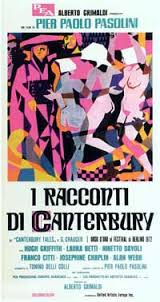
THE CANTERBURY TALES
Italy, 1971, 109 minutes, Colour.
Pier Paolo Pasolini, Laura Betti, Ninetto Davoli, Franco Citti, Hugh Griffith, Josephine Chaplin.
Directed by Pier Paolo Pasolini.
Pasolini films as if Chaucer's Tales were the same as Decameron, only in the English countryside. Some tales are similarly presented and as well as in the other film - plus an inventive picture of the Cook's Tales as a medieval equivalent of Charlie Chaplin and the Keystone Cops, and a sombre tale about homosexuals and injustice. But there is a coarseness in some of the tales, grosser than before, lacking the genuine good-humour of Chaucer (despite Pasolini himself appearing and smiling about it all for us). The finale, with Pasolini's scatological inferno, takes up medieval caustic comment on clergy and visualises them in all their crudity.
1. Did this seem an adaptation of Chaucer? Did it seem English? Medieval?
2. Comment on Pasolini's use of settings - the countryside, costumes, his choice of faces and profiles?
3. How much like Boccaccio were these Canterbury Tales? Were they really Italian? How much were they Pasolini's tales instead of Chaucer? Did he establish convincingly the pilgrimage setting of the Canterbury Tales? Did he follow this up very much? How was Pasolini! a Chaucer? In observation of people? In enjoying telling the stories? The significance of his final smile and writing Amen?
4. What was being satirised in the first story - the old man and his wedding? Infidelity? The effect of having Pan and the nymph in the garden?
5. How strongly made was the point about homosexuals? Was this an effective story? What did it say about class differences and morality? About spying? About reporting to Police for gain? Of paying off officials? of the poor man unable to pay off officials? The actual scene of the burning?
6. Was the story of the seminarian and the wife humorous or disgusting? His gulling of the husband to go into the ark? The sequences in the bedroom and the bedroom window?
7. The story of the cook: how amusing was this in itself? The personality of the cook? The visual style of the filming - making the cook a little man, Charlie Chaplin style of person? The speeding up of the filming? The police like the Keystone Cops? The comedy similar to Mack Sennett comedies? Was this in place in the film? Was it Chaucer? Did this matter?
8. The sequence of the brothel - how disgusting was this? Was it meant to be disgusting? What did it reveal about human behaviour?
9. The story of the two going for the hay - Boccaccio-like, a story of behaviour and immorality and fidelity? A story of mistakes and gulling people? Of fools? Was this merely the point of the story or was there something more?
10. The murder story: insights into greed, suspicions, cruelty?
11. The sequences of hell - in the line of medieval paintings, of grotesque art, the point of the story, the Friars and the devils? How disgusting was this-in itself? Visually? Was the point a legitimate one of satire? What impression did this give of the whole film? And of Pasolini's smile at the end of it?
12. How good a film was this in terms of ordinary standards and taste? Could it be defended that it had its own standards and taste? or is this too much justifying it?
Published in Movie Reviews
Published in
Movie Reviews
Tagged under
Saturday, 18 September 2021 19:26
Cannonball Run II
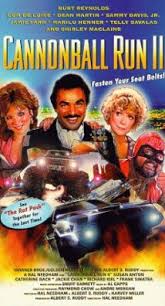
CANNONBALL RUN II
US, 1983, 103 minutes, Colour.
Burt Reynolds, Dom De Luise, Dean Martin, Sammy Davis Jr, Roger Moore, Farrah Fawcett, Ricardo Montalban, Jim Nabors, Susan Anton, Marilu Henner, Catherine Back, Jack Elam, Don Knotts, Jamie Farr, Telly Savalas, Jackie Chan, Shirley Mac Laine, Frank Sinatra.
Directed by Hal Needham.
Cannonball Run II is an inflated sequel to the Burt Reynolds vehicle Cannonball Run. The original was an entertaining, rather inane chase and race film - with many stars including Roger Moore. Farrah Fawcett, Dean Martin, Sammy Davis Jr.
Some of these are back for the sequel - and even more. A lot of television personalities like Telly Savalas and Jamie Farr turn up. Shirley MacLaine? even has a featured role. There is glamour with Susan Anton, Catherine Bach and Marilu Henner. Frank Sinatra appears as himself. A wide range of character actors including Jack Elam, Don Knotts and Ricardo Montalban look in as well as Jim Nabors. Martial arts comic star Jackie Chan comes in for a bit of action. The film seems to be so busy introducing the stars and for them all to have a good time that, while they enjoy it, the audience is left like a group watching a party from the outside.
The plot-line is once again a race from here to there with cars, chases, crashes. Burt Reynolds walks through it all rather nonchalantly with Dom Deluise trying to cheer him up.
It is all cartoon material - co-written and directed by stunt expert Hal Needham (Cannonball Run, Smokey and the Bandit, Hooper).
Published in Movie Reviews
Published in
Movie Reviews
Tagged under